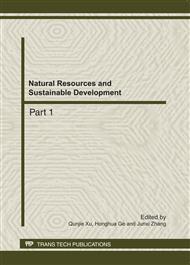[1]
Smith, Kimberly K. Wendell Berry and the Agrarian Tradition: A Common Grace [M]. Lawrence: University Press of Kansas. 2003.
DOI: 10.2307/3985961
Google Scholar
[2]
Berry, Wendell. The Unsettling of America: Culture and Agriculture [M]. New York: Avon. 1996.
Google Scholar
[3]
Berry, Wendell. Another Turn of the Crank [M]. Washington, D.C.: Counterpoint Press. (1995)
Google Scholar
[4]
Berry, Wendell. The Long-Legged House [M]. New York: Harcourt, Brace & World. 1969.
Google Scholar
[5]
Burkhardt, Jeffrey. Coming Full Circle? Agrarian Ideals and Pragmatist Ethics in the Modern Land-Grant University [A]. Paul B. Thompson & Thomas C. Hilde (eds.). The Agrarian Roots of Pragmatism [C]. Nashville: Vanderbilt University Press. 2000. 279-303.
Google Scholar
[6]
Logsdon, Gene. The Mother of all Arts: Agrarianism and the Creative Impulse [M]. Lexington: The University Press of Kentucky. 2007.
Google Scholar
[7]
Griswold, A. Whitney. Farming and Democracy [M]. New York: Harcourt, Brace and Company. 1948.
Google Scholar
[8]
Montmarquet, James A. The Idea of Agrarianism: From Hunter-Gatherer to Agrarian Radical in Western Culture [M]. Moscow: University of Idaho Press. 1989.
Google Scholar
[9]
Phillips, Dana. Is Nature Necessary? [A]. Cheryll Glotfelty & Harold Fromm (eds.). The Ecocriticism Reader: Landmarks in Literary Ecology [C]. Athens: The University of Georgia Press. 1996. 204-222.
DOI: 10.1353/wal.1997.0009
Google Scholar
[10]
Lyon, Thomas J. A Taxonomy of Nature Writing [A]. Cheryll Glotfelty & Harold Fromm (eds.). The Ecocriticism Reader: Landmarks in Literary Ecology [C]. Athens: The University of Georgia Press. 1996. 276-281.
DOI: 10.1353/wal.1997.0009
Google Scholar
[11]
Hilde, Thomas C. & Paul B. Thompson. Introduction: Agrarianism and Pragmatism [A]. Paul B. Thompson & Thomas C. Hilde (eds.). The Agrarian Roots of Pragmatism [C]. Nashville: Vanderbilt University Press. 2000. 1-21.
Google Scholar
[12]
Lasch, Christopher. The True and Only Heaven: Progress and its Critics [M]. NY: W.W. Norton & Company. 1991.
Google Scholar
[13]
Orr, David W. The Urban-Agrarian Mind [A]. Eric T. Freyfogle (ed.) The New Agrarianism: Land, Culture, and the Community of Life [C]. Washington: Island Press. 2001. 93-107.
Google Scholar
[14]
Freyfogle, Eric T. The New Agrarianism: Land, Culture, and the Community of Life [C]. Washington: Island Press. 2001.
Google Scholar
[15]
Wirzba, Norman. The Essential Agrarian Reader: The Future of Culture, Community, and the Land [C]. Lexington: The University Press of Kentucky. 2003.
Google Scholar
[16]
Berry, Wendell. Life is a Miracle [M]. Washington, D. C.: Counterpoint Press. 2000.
Google Scholar
[17]
Graddy, Hank. The Legal and Legislative Front: The Fight Against Industrial Agriculture [A]. Norman Wirzba (ed.). The Essential Agrarian Reader: The Future of Culture, Community, and the Land [C]. Lexington: The University Press of Kentucky. 2003. 222-236.
Google Scholar


